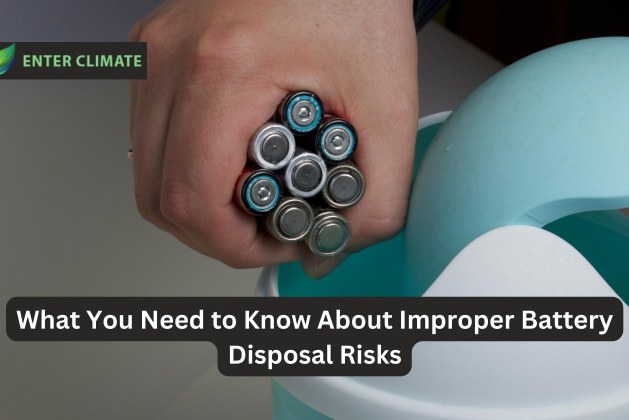As technology evolves, the use of batteries in everyday life has grown exponentially. From powering mobile phones and laptops to vehicles and industrial equipment, batteries are indispensable. However, their improper disposal poses significant risks to the environment, human health, and sustainability efforts. Understanding these risks and adopting better battery waste management practices is crucial to mitigate their harmful effects.
In this blog, we delve into the dangers of improper battery disposal and explore solutions to address this growing problem.
Why Improper Battery Disposal is a Concern
Batteries contain various hazardous materials, including heavy metals like lead, mercury, cadmium, and lithium. When disposed of in landfills or incinerated, these materials can leach into soil and water or release toxic fumes into the atmosphere. The consequences are far-reaching:
-
Environmental Pollution
-
Leaked chemicals contaminate soil and groundwater, affecting agriculture and drinking water supplies.
-
Improper incineration releases harmful gases, contributing to air pollution and climate change.
-
-
Health Hazards
-
Exposure to battery chemicals can cause respiratory issues, skin irritation, and neurological damage.
-
Heavy metals in batteries are linked to long-term health problems, including kidney and liver damage.
-
-
Fire and Explosion Risks
-
Lithium-ion batteries, commonly used in electronic devices, are highly flammable. Improper handling or disposal can lead to fires in landfills and recycling facilities.
-
-
Loss of Valuable Resources
-
Batteries contain recyclable materials like lithium, cobalt, and nickel. Discarding them instead of recycling results in the wastage of valuable resources.
-
Common Improper Battery Disposal Practices
Despite awareness campaigns, improper disposal of batteries remains prevalent. Common practices include:
-
Throwing Batteries in Household Trash: This leads to batteries ending up in landfills, where they pose environmental and health risks.
-
Burning Batteries: Burning releases toxic fumes that harm both the environment and human health.
-
Dumping in Open Areas: Batteries left in open spaces can corrode, releasing harmful chemicals into the surrounding soil and water.
The Importance of Battery Waste Management
Battery waste management is a systematic approach to handle, store, recycle, and dispose of batteries responsibly. It involves:
-
Safe Collection: Setting up designated bins or collection centers for used batteries.
-
Sorting and Segregation: Separating batteries based on type to ensure proper recycling or disposal.
-
Recycling: Extracting reusable materials from batteries to reduce raw material dependence.
-
Compliance with Regulations: Adhering to government guidelines, such as India’s Battery Waste Management Rules, 2022.
Proper Methods for Battery Disposal
To minimize the risks associated with battery disposal, follow these best practices:
1. Use Designated Recycling Centers
Many cities have collection centers or drop-off points for used batteries. Ensure batteries are taken to these facilities for proper recycling.
2. Store Batteries Safely
If immediate disposal isn’t possible, store batteries in a cool, dry place, away from flammable materials. Ensure terminals are taped to prevent short circuits.
3. Participate in Take-Back Programs
Several manufacturers and retailers offer take-back programs for batteries. Take advantage of these initiatives to ensure responsible disposal.
4. Educate Employees and Consumers
Businesses should train employees on proper battery waste management practices and educate consumers through awareness campaigns.
The Role of Businesses in Battery Waste Management
Businesses play a critical role in reducing the risks of improper battery disposal. Here’s how they can contribute:
-
Implement Recycling Policies: Establish in-house recycling programs to collect and manage used batteries.
-
Collaborate with Certified Recyclers: Partner with authorized recycling facilities to handle battery waste safely.
-
Adopt Eco-Friendly Alternatives: Shift to rechargeable batteries or other sustainable options to reduce waste.
-
Conduct Regular Audits: Monitor and evaluate battery disposal practices to ensure compliance with regulations.
India’s Battery Waste Management Rules, 2022
The Indian government has introduced stringent guidelines under the Battery Waste Management Rules, 2022. These rules mandate:
-
Extended Producer Responsibility (EPR): Manufacturers are responsible for the collection and recycling of used batteries.
-
Consumer Awareness Programs: Businesses must educate consumers about proper disposal practices.
-
Recycling Targets: Companies are required to meet specific recycling targets based on the type and quantity of batteries produced.
Sustainable Alternatives to Conventional Batteries
Exploring sustainable battery technologies can significantly reduce the risks associated with improper disposal. Some promising alternatives include:
-
Solid-State Batteries: These batteries use solid electrolytes, reducing the risk of leakage and fire hazards.
-
Bio-Based Batteries: Made from organic materials, these batteries are biodegradable and environmentally friendly.
-
Rechargeable Batteries: Encouraging the use of rechargeable options can significantly lower waste generation.
Conclusion
Improper battery disposal poses severe risks to the environment, human health, and resource sustainability. By understanding these risks and adopting proper battery waste management practices, businesses and individuals can make a significant difference. From using designated recycling centers to exploring sustainable alternatives, every step counts toward a greener and safer future.
Businesses must lead by example, comply with regulations, and educate their stakeholders to ensure effective battery waste management. Together, we can mitigate the risks and create a sustainable ecosystem for future generations.
FAQs
1. Why is improper battery disposal dangerous?
Improper disposal can lead to soil and water contamination, air pollution, and health hazards due to toxic chemicals in batteries.
2. How can businesses ensure proper battery waste management?
Businesses can set up recycling programs, partner with certified recyclers, and educate employees and consumers about safe disposal practices.
3. Are rechargeable batteries a better option for reducing waste?
Yes, rechargeable batteries last longer and generate less waste, making them an eco-friendly alternative to single-use batteries.




Leave a comment